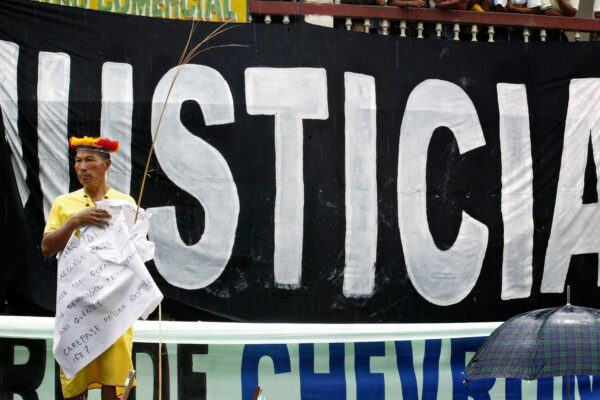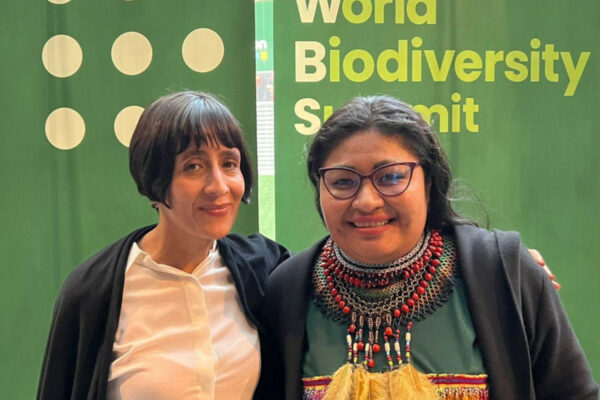Los Angeles – It was a collision of wildly contrasting worlds that occurred on May 6: in a Beverly Hills corporate office Roberto Cobaria, the council president of 23 communities of the indigenous U’wa people of Colombia, sang a song in the language of his people to three top executives of the Occidental Oil and Gas Corporation.
Cobaria said the U’wa teach the song to their children to help them learn the importance of respect – for family, for others, for life.
Cobaria traveled in early May to New York, Washington and Los Angeles from his rural community, which embraces sections of five departments in northeastern Colombia, bearing a somber message: If Occidental insists on exploring and drilling for oil in territory the 5,000 U’wa claim is theirs, the Indians, in accordance with their oral history, will commit collective suicide by leaping from a cliff in the Andes.
According to Cobaria, this ultimatum was decided upon by tribal elders after contradictory rulings from two Colombian courts left intact Occidental’s government-granted license to operate on land claimed by the Indians under ancestral titles.
“I told [the executives] I came with an attitude of respect. I asked them to excuse me for coming to bother them but that it wasn’t the fault of my people that I had to come,” Cobaria said at a news conference after the meeting.
An environmental lawyer who sat in on the meeting said he believed Cobaria’s song affected the executives. “I think they realized that it is not just a bunch of people they are dealing with, but a whole culture,” he said.
Cobaria’s U.S. trip, sponsored by Amazon Watch, the Action Resource Center and the Coalition for Amazonian Peoples and Their Environment, is indicative of a growing activism among Latin American indigenous and grassroots organizations in the international arena. As globalization of the economy redefines the roles of governments and private investors, and as capital crisscrosses continents more freely, nongovernmental organizations are taking the lead in dealing directly with the economic actors that affect their lives. In this case, an Indian from a remote area of Colombia got a face-to-face meeting with executives of the largest oil developer operating in Colombia.
Ultimatum on hold
For now, both the U’wa’s collective death threat and Occidental’s seismic exploration in Colombia’s contested Samore area have been placed on hold. Cobaria and his legal adviser, Edgar Mendez from the National Indigenous Organization of Colombia – ONIC – have returned to the Andean foothills and the eastern Colombian plains to consult with the werjaya – the U’wa shamans – and elders. Occidental’s executives back in California are contemplating an invitation from Cobaria to visit the U’wa homeland. They are also digesting the Beverly Hills encounter.
“We learned that this is a complex matter. We got into a discussion with Mr. Cobaria of the [U’wa] spiritual views of the world, of how the U’wa react to the environment – the weather, the sky, the earth, what’s under the earth – of what’s important in their society and culture. It was quite interesting,” said Lawrence P. Meriage, vice president of executive services and public affairs for Occidental, in a telephone interview from the corporate world headquarters in Bakersfield, Calif.
No more ‘easy places’
Occidental, Meriage said, is “committed to see what we have to do to find solutions.” He said inviting third party mediators into the negotiating process, “academics, not activists,” might help Occidental and the U’wa strike an agreement to allow oil development with respect for the indigenous culture and land. Under Colombia’s 1991 Constitution, indigenous communities must be consulted in decisions about natural resource development projects that will affect them.
Tensions like those between Occidental and the U’wa are likely to multiply in the future as economies that previously restricted capitalist development seek paths out of poverty by integrating into global markets.
The increase in demand for energy has begun to place greater and greater pressures on culturally and environmentally sensitive areas. According to Meriage, “All of the easy places to find oil and gas have been explored.”
Meriage pointed to Occidental’s programs in the Ecuadoran Amazon as “model operations of how things should be done in environmentally sensitive areas.” There, he said, the company backs micro-enterprise development – fish farms and chicken hatcheries – in surrounding communities. He claimed companies like Occidental are learning to use “state of the art technology” to “leave the smallest possible footprint behind them” in such regions.
But environmental activists and advocates of indigenous communities tell another story. Lucy Braham, from the Malibu, Calif.-based Action Resource Center, was critical of Occidental’s track record in the Andes. In Ecuador and Peru, she said, “there is a pattern of disregard for indigenous communities in favor of company profits.” Texaco and the state oil concern, Petroecuador, came under fire from U.S. and European environmental organizations for their track record in the Ecuadoran Amazon.
Meriage said in the U’wa case, Occidental has offered scholarships to eight or 10 indigenous students annually and has discussed setting up health, education and other development programs in local communities. He said that after a string of negotiating sessions, the U’wa had previously agreed to allow Occidental to go ahead with seismic activity on the U’wa reservation.
ONIC’s Mendez said many indigenous communities have been “bought off” with “schools and cement structures.” He said “outboard motors and prefabricated houses” are the “mirrors” of today, referring to the Spanish conquistadores’ use of such objects as mirrors and trinkets in business deals with Indians when they arrived in the Americas over 500 years ago.
Mendez said policies used by multinational companies have created divisions among some indigenous communities. Some leaders, he said, have been co-opted into signing agreements. “Many Indians have forgotten their traditional, mythical world and negotiated, even though they believe, like the U’wa, that the death of the earth will bring their death. In many communities, they have been bought off, deceived.”
Cobaria insisted that oil production on U’wa land must not go forward. In U’wa cosmology, the land is the flesh of the mother, the root of creation, the sustenance of life and the font of collective memory and spirit.
“Oil is the blood of our mother earth. … It is not negotiable,” he told reporters in front of Occidental’s Beverly Hills offices. “If Occidental moves in by force, there will be a suicide.”
‘We cannot negotiate’
Cobaria said no dialogue took place with Occidental representatives during the May 6 meeting. “No one took any positions. They gave us no answers and they did not commit themselves to giving an opinion. We can hold thousands of meetings like this, but this is a lost cause. We cannot negotiate,” he said.
Mendez said the meeting served to clarify previous comments from Occidental representatives linking the U’wa people to Colombian guerrillas. Operating near U’wa territory are rebels from the Armed Revolutionary Forces of Colombia – FARC – and the National Liberation Army – ELN. One of the pillars of the ELN’s political platform is the nationalization of natural resources, especially petroleum. The rebels have bombed oil pipelines at least 460 times since 1985. Other guerrilla practices include the kidnapping of oil company executives and the extraction of bribes – often referred to colloquially as “war taxes” – from foreign investors operating in Colombia.
“We regard the U’wa as victims of the guerrillas. We have been victims of the guerrillas. We have had seismic workers killed, Colombian nationals working for Occidental,” Meriage said. A chronology of the Samore oil scheme provided by Meriage lists instances where rebels reportedly threatened the U’wa, prompting them to postpone signing agreements with the corporation.
Debra Delavan, from the Washington-based Coalition for Amazonian Peoples and their Environment, said linkage of the U’wa to rebels is equivalent to a death sentence for the Indians. “Given the situation in Colombia, any allegations about involvement with guerrilla forces in Colombia can set up the U’wa people for reprisal from the military and paramilitary forces,” she said.
A news release from the organization expressed concern about such confusion “in light of New York Times revelations in 1996 that Occidental pays the Colombian military millions of dollars each year for security.”
Meriage said the company does pay for some security, but that Colombian troops are there only to protect people and assets, not in an offensive capacity. “We are absolutely required to [provide money] out there if we want any protection at all,” he said. Ten percent of Occidental’s operating costs in Colombia, he said, go toward paying for a wide variety of security measures.
Cobaria claimed that cultural, spiritual and physical survival – not rebel threats – have inspired his people to maintain their staunch opposition to Occidental’s activities on their land. Standing in front of Occidental’s offices, flanked by a banner saying, “Stop the OXY-cution of the U’wa,” he employed a logic unfamiliar to a profit-driven world to try to explain his community’s resistance: “If the oil is theirs, from where did they bring it? There is a reason oil has two names – we call it duidia – and it is older than the world itself.”
End













